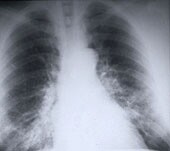Two experimental medications target mutation that fuels treatment resistance
THURSDAY, April 30, 2015 (HealthDay News) — Two experimental drugs may help patients whose lung cancer has become resistant to the latest available treatments, according to separate studies published in the April 30 issue of the New England Journal of Medicine.
In one study, researchers tested the drug AZD9291. They found that among 127 patients with a T790M mutation, the response rate was 61 percent. Most patients went at least six months with no cancer progression, and half went about 10 months or longer. That second figure is similar to what’s seen with Tarceva (erlotinib), one of the first-line epidermal growth factor receptor (EGFR) inhibitors, Pasi Janne, M.D., Ph.D., lead researcher on the study, told HealthDay. Janne is an oncologist at the Dana-Farber Cancer Institute in Boston.
“So if you give this after a patient becomes resistant (to an EGFR inhibitor), you’re doubling the time that they’re on a drug that works,” Janne said. Just as important, he said, the new drug is better tolerated than EGFR medications — without the potentially severe skin effects of those drugs. Six percent of patients did have a “serious adverse event” thought to be caused by the medication. But the most common side effects were diarrhea, nausea, and rash, which were manageable, Janne said.
The second study, of an oral drug called rociletinib, had similar results. Among patients with a T790M mutation, the response rate was 59 percent. Hyperglycemia, diarrhea, nausea, and rash were the most common side effects.
AstraZeneca, the developer of AZD9291, funded the first study, and Janne has served as a consultant to the company.
Full Text 1 (subscription or payment may be required)
Full Text 2 (subscription or payment may be required)
Editorial (subscription or payment may be required)
Copyright © 2015 HealthDay. All rights reserved.








